Are unpredictable production schedules sabotaging your coffee business? Late deliveries of custom accessories frustrate customers and damage your reputation. Without reliable timelines, your entire supply chain risks collapse.
The ideal production lead time for custom-branded coffee accessories typically ranges from 4 to 7 weeks, depending on product complexity and customization requirements. Mitigation strategies include proactive planning with 8-12 week buffers, streamlined approval processes, strategic supplier collaboration, and optimized logistics management.
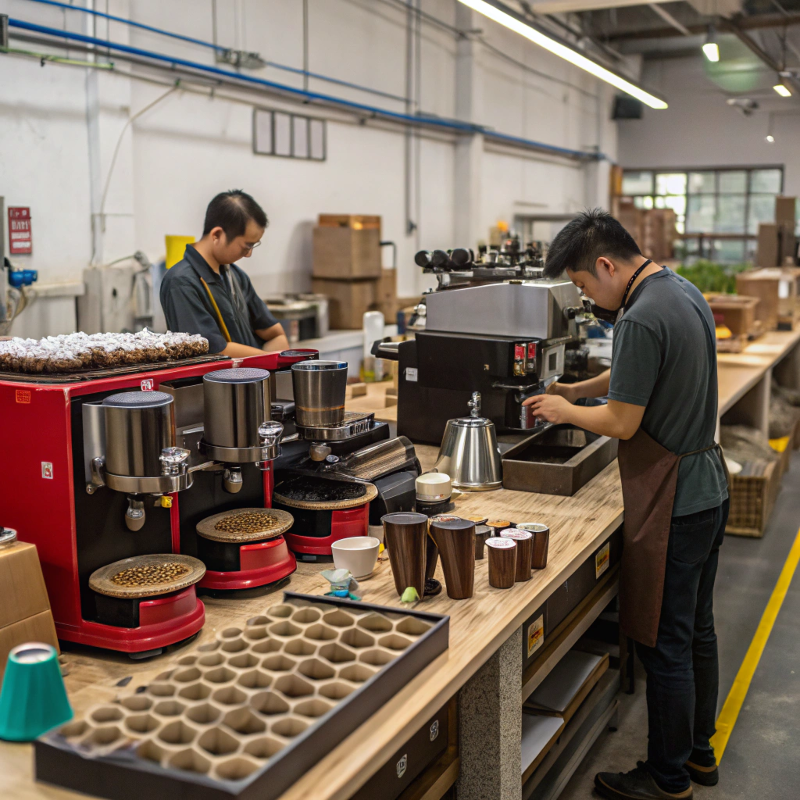
After years in the custom coffee accessory manufacturing business, I've seen how production delays can devastate a distributor's seasonal planning. Let me walk you through what you need to know about realistic timelines and proven strategies to keep your supply chain running smoothly.
What are realistic production timelines for different coffee accessories?
Coffee distributors often underestimate manufacturing timelines, leading to disappointed customers and rushed orders. Different accessories require varying production windows that can significantly impact your planning.
Production timelines vary by product: coffee bags with valves require 5-7 weeks, custom plastic cups about 4 weeks, and standard items like labels 15-20 days. More complex items with premium finishes or intricate designs typically need additional time for quality assurance.
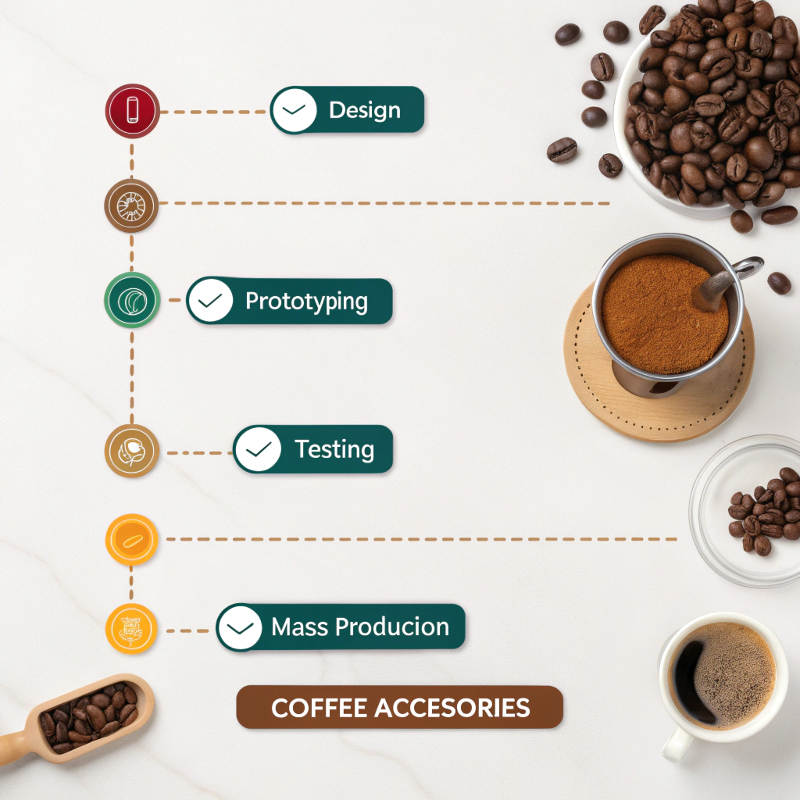
The complexity of coffee accessories directly correlates with production duration. From my experience at SIF Coffee Tools, I've observed that precision-engineered items demand more attention to detail. For example, our premium coffee baskets with custom branding require meticulous quality control that can't be rushed.
Production Timeline Breakdown by Product Type
| Coffee Accessory | Standard Lead Time | With Custom Branding | Complexity Factors |
|---|---|---|---|
| Coffee Bags with Valves | 3-5 weeks | 5-7 weeks | Material sourcing, valve installation, printing method |
| Portafilters | 2-3 weeks | 4-5 weeks | Handle customization, metal finishing, ergonomic testing |
| Tampers | 2 weeks | 3-4 weeks | Material quality, precision machining, logo application |
| Distribution Tools | 2-3 weeks | 3-5 weeks | Mechanical precision, balance testing, surface treatments |
| Coffee Baskets | 1-2 weeks | 3-4 weeks | Hole precision, material thickness, polishing requirements |
| Shower Screens | 1-2 weeks | 2-3 weeks | Mesh density, frame customization, water flow testing |
These timelines reflect optimal conditions with all specifications clearly defined from the start. I've found that accessories requiring complex engineering processes, like our high-performance manual grinders, benefit from extended production schedules. The additional time allows our engineers to source the perfect materials and thoroughly test functionality before shipping. As Muhammad, one of our UAE distributors, discovered, rushing precision coffee tools can compromise the very qualities that make them premium products in the first place.
What factors influence lead times for custom coffee accessories?
Unpredictable delays leave distributors scrambling to meet commitments. Understanding what drives extended timelines helps avoid the painful conversation where you must explain to customers why their order isn't arriving on schedule.
Lead times are influenced by customization complexity, material availability, production capacity, approval processes, and shipping logistics. Each factor adds variability, with design intricacy and global supply chain volatility creating the most significant impacts on timeline predictability.
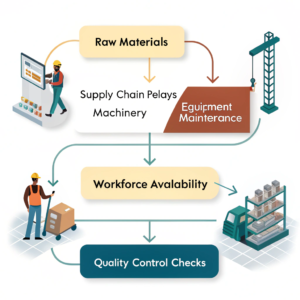
From operating our 3000m² manufacturing facility with 80 punching machines, I've gained firsthand insight into the critical factors that affect production schedules. These insights help our clients like Muhammad plan their business operations more effectively.
Key Factors Influencing Production Lead Times
Customization Depth[^1]
The complexity of your branding requirements significantly impacts timelines. Simple logo applications might add just a few days, while multi-color, multi-location branding with special finishes can extend production by 1-2 weeks. At SIF Coffee Tools, we've developed specialized processes for applying custom branding to stainless steel surfaces without compromising durability – a technique that requires precision but delivers exceptional results.
Material Sourcing[^2]
Premium coffee accessories demand high-grade materials that meet FDA, Rohs, Reach, and LFGB standards. When materials are in high demand (particularly during global supply chain disruptions), lead times extend. For example, during recent aluminum shortages, we had to extend production timelines for certain tamper models by an additional week. We now maintain larger inventory buffers of essential materials to minimize these disruptions.
Quality Control Requirements[^3]
Each of our products undergoes rigorous testing to ensure consistent performance specifications. Our portafilters, for instance, require pressure testing that cannot be rushed. This quality assurance process typically adds 2-3 days to production schedules but prevents costly field failures that would damage your brand reputation.
Seasonal Demand Fluctuations[^4]
Industry-wide production capacity tightens before major coffee exhibitions and holiday seasons. Orders placed in September-October often experience extended lead times as manufacturers manage peak demand. One of our European distributors learned to place orders for Q4 needs by early August, securing priority production slots before the rush begins.
How can coffee accessory distributors mitigate production delays?
Production delays threaten your revenue and reputation as a reliable supplier. Without effective mitigation strategies, you remain vulnerable to manufacturing uncertainties beyond your control.
Mitigate delays by planning orders 8-12 weeks ahead with 10-15% timeline buffers, approving designs within 48 hours, consolidating feedback, choosing digital production methods, verifying all-inclusive pricing, and implementing real-time shipment tracking systems.

After supplying coffee accessories to distributors across the Middle East, Europe, and Asia, I've developed practical strategies that minimize disruptions. These approaches have proven particularly valuable for clients like Muhammad who operate in competitive markets where reliability differentiates premium suppliers.
Proven Delay Mitigation Strategies
Strategic Order Planning
The most effective approach is proactive scheduling. At SIF Coffee Tools, we recommend our distribution partners place orders at least 8-12 weeks before their target delivery dates. This buffer accommodates not only production but also shipping variabilities, especially important when exporting to markets like the UAE and Saudi Arabia. During my conversations with Muhammad, we developed a quarterly forecasting system that helps his business maintain optimal inventory while avoiding rush charges.
Streamlined Approval Workflows
Approval delays frequently extend production timelines unnecessarily. I've implemented a rapid approval system where our team sends digital proofs within 24 hours of finalizing specifications. Distributors who commit to reviewing these proofs within 48 hours consistently experience shorter overall lead times. To facilitate this, we provide our clients with detailed approval checklists and clear mockups that minimize confusion.
Supplier Partnership Development
Building strong relationships with manufacturers creates flexibility during tight production periods. Our most successful distributors maintain open communication channels and provide accurate forecasts that help us prioritize production scheduling. When Muhammad's business experienced unexpected demand for custom tampers, our established relationship allowed us to adjust production priorities and meet his timeline without disrupting other orders.
What strategies help when working with coffee accessory manufacturers?
Poor communication with manufacturers creates misunderstandings that lead to costly errors and delays. Without clear protocols, your custom accessories may arrive late, incorrect, or not at all.
Effective manufacturer collaboration includes establishing comprehensive specification documents, creating realistic timeline agreements, scheduling regular progress updates, developing contingency plans for common delays, and building relationships beyond transactional purchases.
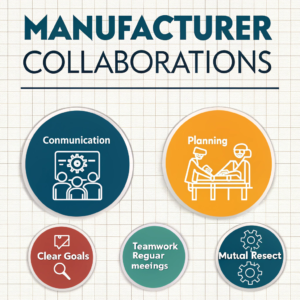
After establishing our manufacturing facility with 5 dedicated assembly lines and 80 advanced punching machines, I've gained unique perspective on what makes manufacturer-distributor relationships successful. Clear communication standards and mutual understanding form the foundation for reliable production partnerships.
Effective Manufacturer Collaboration Techniques
Comprehensive Specification Documentation
Detailed documentation prevents the most common causes of delays. Our most efficient distributors provide complete specification packages that include precise measurements, material requirements, branding details, and packaging expectations. At SIF Coffee Tools, we've developed a standardized specification template that guides clients through all required information, eliminating back-and-forth communications that can add days or weeks to production timelines.
Staged Production Approach
For complex custom projects, we recommend a staged approach with clear milestones and approval points. This methodology allows for early identification of potential issues before full production begins. When developing custom distribution tools for Muhammad's premium line, we created several prototypes with different handle designs before committing to full production. This approach added one week to the initial timeline but prevented a potentially costly redesign later.
Cultural and Time Zone Considerations
Working with manufacturers across international boundaries requires awareness of cultural business practices and time zone differences. Our team in China maintains extended hours to accommodate clients in the Middle East and Europe, ensuring questions can be answered without 24-hour delays. Understanding these dynamics helps set realistic expectations for communication timing and decision-making processes.
Quality Verification Systems
Implementing agreed-upon quality verification checkpoints throughout production prevents discovering issues only after completion. For our B2B partners, we offer video demonstrations of quality testing and provide detailed quality reports with statistical process control data. This transparency builds confidence and allows distributors to communicate expected timelines to their customers with greater certainty.
How should seasonal demands be factored into production planning?
Seasonal spikes overwhelm unprepared supply chains, leaving coffee distributors unable to fulfill orders during peak demand periods. Without strategic planning, your most profitable sales windows become your biggest headaches.
Factor seasonal demands into production by analyzing historical sales patterns, scheduling orders 1-2 months before anticipated demand increases, developing relationships with manufacturers who offer priority scheduling, and creating contingency plans for unexpected volume spikes.
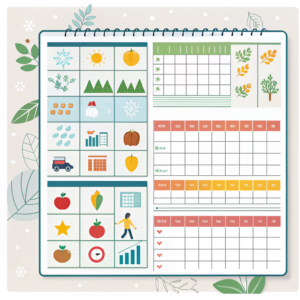
Coffee accessories experience distinct seasonal patterns that vary by market. Through our extensive export experience to the Middle East, European Union, and Asian markets, I've observed how these patterns affect production capacity and delivery timelines across the industry.
Seasonal Production Planning Strategies
Regional Market Calendar Analysis
Different markets experience peak demand at different times. In the Middle East, particularly in the UAE and Saudi Arabia where Muhammad distributes our products, we see increased demand before and during Ramadan when coffee consumption patterns shift. European markets typically experience higher demand before Christmas and summer tourism seasons. Understanding these regional variations allows for more precise production scheduling.
| Market Region | Peak Season 1 | Peak Season 2 | Order Placement Window |
|---|---|---|---|
| Middle East | Pre-Ramadan (varies yearly) | September-October | 3 months before peak |
| European Union | November-December | May-June | 2-3 months before peak |
| Southeast Asia | Lunar New Year period | August-September | 3-4 months before peak |
| North America | November-December | August (back-to-school) | 2-3 months before peak |
Production Capacity Reservation
At SIF Coffee Tools, we offer our regular distributors the option to reserve production capacity during peak seasons without specifying exact product details. This approach allows distributors like Muhammad to secure manufacturing slots while finalizing specific product requirements closer to production time. This flexibility has proven particularly valuable for distributors who need to adapt to changing market conditions while maintaining reliable delivery schedules.
Inventory Buffer Management
Strategic inventory management for seasonal demands requires balancing holding costs against stockout risks. Our most successful distributors maintain core inventory of customized essentials while using just-in-time ordering for specialty items. When Muhammad anticipated increased demand for custom portafilters during Dubai's tourism season, we collaborated on a production schedule that delivered products in three strategic batches rather than a single large order, optimizing both cash flow and storage requirements.
Contingency Supplier Network
Developing relationships with multiple manufacturers provides fallback options during capacity constraints. While maintaining SIF Coffee Tools as their primary supplier for premium coffee accessories, several of our distributors maintain relationships with secondary suppliers for emergency situations. This redundancy adds resilience to their supply chain without compromising the quality standards their customers expect.
Conclusion
The ideal 4-7 week production timeline for custom coffee accessories requires strategic planning, streamlined approvals, and strong manufacturer relationships. By implementing these proven strategies, you'll transform potential delays into competitive advantages.
---
[^1]: Understanding customization depth can help you optimize your production timelines and meet customer expectations.
[^2]: Exploring material sourcing can provide insights into managing supply chain disruptions and improving efficiency.
[^3]: Learning about quality control can help ensure product reliability and prevent costly failures.
[^4]: Understanding seasonal demand can aid in better planning and prioritizing orders to avoid delays.



